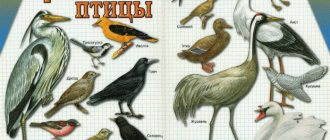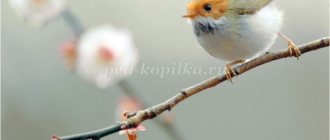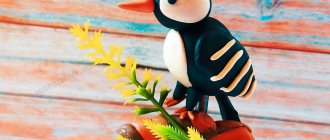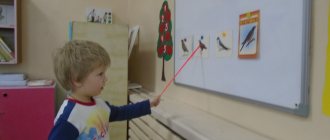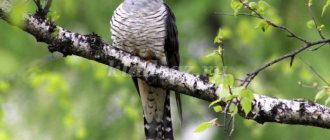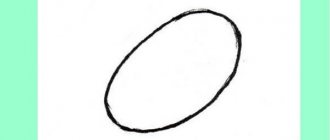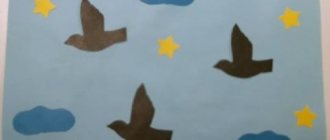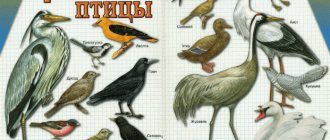Migratory birds. Summary of direct educational activities in the preparatory group
Voss: Guys, listen to E. Blagina’s poem “Flying away, Flying away.” Soon white snowstorms will raise the snow from the ground. They fly away, they fly away. The cranes fly away. You can’t hear the cuckoo in the grove and the birdhouse is empty. The stork flaps its wings - It flies away, it flies away. A patterned leaf sways in a blue puddle on the water. A rook walks with a black rook in a garden ridge. The rare rays of the sun, crumbling, turned yellow. They fly away, they fly away. The rooks also fly away. Voss: Guys, what time of year is the poem talking about? Children: About autumn Voss: Who is the poem about? Children: About birds that fly away. Voss: That's right. And today in class we will talk about migratory birds. Question: why do you think birds fly away in the fall? Children: because it’s getting cold, there’s nothing to eat. Voss: correct. The most important thing is that there is no food. Vos: you know that in the fall many insects disappear: they either hide or die. This means that if birds eat insects, they will have nothing to feed themselves in the winter. Guess riddles about insectivorous birds:- Palace on a pole
There is a singer in the palace, and his name is...... (starling).
- He always sings beautifully
Loudly, commanded, playfully Guess quickly, What kind of bird..... (nightingale).
- This bird never builds nests for its chicks. (cuckoo).
- I'm making a nest under the roof
From lumps of clay I put a downy feather bed on the bottom for the chicks. (Swallow) Look: look at the insectivorous birds: starling, swallow, cuckoo, nightingale. All these birds have a straight, elongated or pointed beak to make it easier to catch insects. Vos: Now let’s play the game “Who votes” (with a ball). Rules of the game: the bird names the bird and asks the child how it sounds, then throws the ball to the child. The child catches the ball, answers the question and throws the ball back. Nightingale…. (singing) Crane….(cooing) Crow…..(croaking) Cuckoo…..(cuckooing) Duck….(quack) Pigeon….(cooing) Sparrow….(chirping) Vos-l: We did the task well. Well done. Voss: Autumn has come, it has become cold and hungry. Birds began to gather in flocks and fly away to warmer regions. Have you ever seen high in the sky how birds gather in flocks and fly away? Children: No. Vos: We rarely get to see them fly away. Because they fly mostly at night: it’s safer. But before the flight, they make test flights, eat more than usual, put on fat - there is nowhere for them to eat during the flight. In flight, they are guided by the stars, and if the sky is overcast and the stars are not visible, then they are guided by the magnetic oscillations of the Earth. Do you know that during the flight, many birds adhere to a strict order? Moreover, different birds have their own order. Some birds fly away all together i.e. "flocks". Cranes, geese, swans fly in the form of a triangle - a “wedge”. Ducks, gulls, waders line up in a straight line - a “chain”. Starlings, thrushes and other small birds do not like order: they fly at random. But large birds of prey (eagles, hawks, falcons) do not recognize company: they fly alone. Physical education moment. Outdoor game “Flies away, doesn’t fly away.” Rules of the game: the child lists the names of the birds, and the children run and flap their wings when they hear the names of a migratory bird. If they hear wintering or poultry, children squat down. Voss: We played well. And now I will distribute pieces of paper to you and each of you will draw the type of flight that you liked best - “flocks”, “wedge”, “chain”. Children: draw the flight of birds to the music. Voss: I’ll start the sentence now, and you will continue it. -Birds that feed on insects are the first to fly south, because……./ insects are hiding and they have nothing to eat/. -The woodpecker can be called a forest doctor, because / he takes out beetles and insects from under the bark /. -The cuckoo does not hatch its chicks because / it does not build its own nests /. -Everyone loves to listen to the nightingale, because / he sings beautifully and bursts into song /. — In the spring, migratory birds fly back because/they need to hatch their chicks/. Well done. Did a good job. A didactic game is being played: “Migratory and wintering birds.” The teacher lays out pictures of birds on the table. Gives the task to the girls to find wintering birds among the pictures, and to the boys to find migratory birds. Voss: What birds did we talk about? Children: About migratory ones. Vos: What new have you learned about migratory birds? Children: travel in a variety of ways. Vos: How do they find their way to warmer regions and back to us? Children: They navigate by the stars. Voss: What interesting things did we learn about the cuckoo? Children: Doesn't build its own nest. Voss: I liked the way you worked in class. They listened carefully and answered my questions. Well done!
